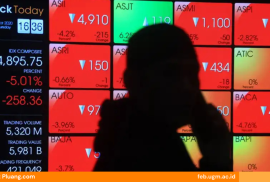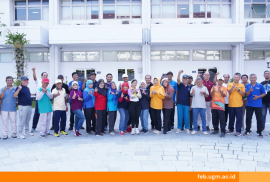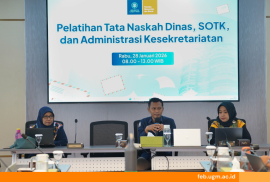Faculty of Economics and Business UGM in cooperation with Australian National University (ANU) Indonesia Project held a Public Lecture on the topic of “Anti-Globalisation, Poverty and Income Inequality.” Public lecture was held on Friday, December 15, 2017 at Kertanegara Room FEB UGM. The event started at 09.00 to 11.00 and was attended by more than 200 participants from S1, S2, practitioners, lecturers and researchers. The event was opened with remarks by the dean of FEB UGM, Dr. Eko Suwardi, M.Sc. which emphasizes the importance of discussion topics for Indonesia. Then, followed by a welcome from Lydia Napitulu, S.E., M.Sc., who is a representative of the Australian National University.
This public lecture was presented by Prof. Peter Warr a John Crawford’s Professor of Agricultural Economics, and also Director of Poverty Research Center, Australian National University. Prof. Warr opened the discussion with a question: what causes increased inequality in Indonesia?
Prof. Warr then explained about the increasing gini ratio in Indonesia. “Gini ratio is a tool to measure inequality income. If the coefficient gini value is 0 means perfect equity, whereas if the coefficient gini value is 1 means there is more chance of inequality,” said Prof. Warr. Proff. Warr showed us that the Gini index of inequality in Indonesia increased from 0.303 in 2000 to 0.41 in 2015, one of the largest increases ever recorded for any country. The objective of this study was to estimate how far the protectionism applied, both at the global level and within Indonesia, to explain the observed slowdown in poverty reduction and rise in inequality. To explain that, Prof Warr used the INDONESIA‐E3 model, a general equilibrium model of the Indonesian economy that enables detailed calculation of the poverty and inequality effects of policy changes and external shocks. The essence of the analysis is the comparison between the welfare of households under the existing policies and what their welfare would be under a hypothetical alternative set of policies –the counterfactual.
For the findings, Prof. Warr explained that increased protectionism at the global level since 2008 reduced the annual rate of poverty reduction in Indonesia by 0.018 percentage points. Increased protectionism within Indonesia between 2008 and 2015 also reduced the annual rate of poverty reduction by 0.010 percentage points. Therefore, protectionism increased poverty, but this effect was small. Increased protectionism from 2008 to 2015 also increased inequality, but the effect was smaller still.
“Anti-globalisation had harmful effects for both poverty reduction and inequality within Indonesia. But, that was not the major cause of either the slowdown in poverty reduction or the rise in inequality. The main cause of these changes are important issue for ongoing research,” said Prof. Warr.
Source: Nindya/FEB




